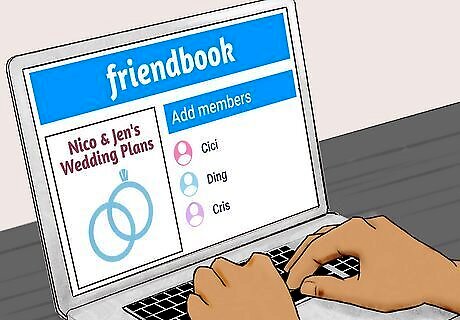
views
Respecting Each Other’s Differences

Let go of expectations. Keep an open mind about your son- or daughter-in-law’s family as you get to know them, and don’t assume that their differences are flaws. Every family has their own traditions, culture, and quirks, so it’s not realistic to expect that your child’s in-laws will do everything the same way your family does. You also have to consider that you will have to "share" your child and their family with the in-laws. For instance, as soon as your grandchildren are born, you might expect to be the primary babysitter. However, if the other in-laws live nearby, they may want to share in the childcare duties, too. Your child’s in-laws might also have different traditions surrounding weddings, holidays, and other celebrations. Remember that by accepting your child’s in-laws culture, you will be supporting your child.

Ask your child to fill you in about their in-laws. Before you meet your child’s in-laws for the first time, ask your child whether there is anything you need to know about them. Find out whether there are any topics you should avoid talking about or any rules of cultural etiquette you should observe. You might say, “We want to make sure the first meeting is pleasant. Fill me in on your in-laws, dear.”

Ask questions to get to know each other. Be friendly and curious when you get together with your child’s in-laws. Try to establish common ground by finding out whether you share any interests or have had similar experiences. Being genuinely interested in your child’s in-laws is a good way to start the relationship on the right foot. Everyone is flattered when someone else wants to know more about them. Keep topics of conversation light when you’re still getting to know each other. Avoid touchy topics that might offend or upset someone. If you’re worried about not having enough to talk about, ask your child to help you establish common ground with their in-laws.

Look for their good traits. Maintain a positive frame of mind towards your child’s in-laws, and focus on the qualities you appreciate in them. If you’re unsure about whether you like them, give them the benefit of the doubt – time and familiarity may help you to like them more in the future. If you like your child’s spouse, start by appreciating the fact that these people raised your son- or daughter-in-law. You might say, "I don't know you well, but you've raised a mighty fine daughter. We are so glad to have Jessica as a part of our family." By focusing on the positive, you will be creating a foundation for cooperative family relationships in the future.
Sharing Family Responsibilities

Be adaptable when it comes to family plans. Holidays, summer vacations, and other family events can become complicated when your child and their spouse have to divide their time between both families. Be understanding of logistical issues, and consider having your family celebrations at less traditional times to avoid scheduling conflicts and squabbles. For instance, maybe you could have your family’s Christmas get-together on Boxing Day instead. When it comes to holidays, make sure to plan far in advance. Holidays can be a stressful time, but by planning ahead you will ensure that there is plenty of time to voice your needs ahead of time.

Avoid trying to compete with your child’s in-laws. Don’t try to outdo your son- or daughter-in-law’s parents in terms of personal qualities, favors, or gifts. You and they are different people, and there’s no point in comparing yourself to them. Instead, be yourself and focus on maintaining the best relationships you can with your child and their in-laws. It’s particularly important to avoid competing over any grandchildren you have. Love and quality time are more important to kids than expensive presents or trips. Keep in mind that your children and grandchildren will learn many of their behaviors from you. Try to focus on spending time with them rather than spending money on them.

Resist jealousy. Don't take it personally if your child spends more time with their in-laws. Sometimes it’s not practical for a young couple to split their visits between their families equally, especially if long distances and travel costs are a concern. Your child became part of their spouse’s family when they got married, so try not to feel hurt if they visit their in-laws frequently. If you feel like your child makes more of an effort to see their in-laws than to visit you, have a heart-to-heart with them about the situation. Be honest about your feelings, but avoid accusing them of not caring about you. Try using an “I feel” statement, such as, "I feel like you don't value yourself and our family when you make more of an effort to spend time with your in-laws than you do with your family.” Say something like, “We miss you, and it bothers us that you come to see us so rarely, especially because you see Jane’s family so much. What can we do to make visiting easier for you?”

Compromise. When you have a family conflict, work with your child and their in-laws to come up with a solution that’s acceptable to everyone. Take everybody’s personality and needs into account as you look for a resolution. Your child’s in-laws will be more likely to work with you if you take a positive, proactive approach to finding a good solution. Remember that you can only control your own actions. If your child’s in-laws refuse to cooperate, it’s natural to feel disappointed, but you should still take the high road to avoid damaging the relationship. Keep in mind that your child’s in-laws will always be a part of your child’s family. You can support your child by remaining civil and calm when you are confronted with personalities that are different from your own.
Communicating Well

Stay in the family loop. Communicate regularly with your child, and ask them to keep you updated on their family happenings too. Misunderstandings and resentment can arise if people are left out of discussions or not informed of plans. If you live far away from each other, consider having a weekly phone call or Skype session with your child and their spouse. It’s especially important to communicate early and frequently about time-sensitive topics like holiday plans.

Set boundaries. If you interact with your child’s in-laws frequently, create boundaries that will help you keep the relationship positive and enjoyable for everyone involved. Setting a few ground rules can prevent conflicts later on. If your child’s in-laws do or say things that you find inconsiderate or uncomfortable, consider talking to your child and their spouse about it. Your son- or daughter-in-law is probably the best person to handle issues with their parents. For instance, if you had made plans to eat dinner with your child and their family, but the in-laws encroach on your plans, you might express your frustration. Ask your child and their spouse to ask that they respect your plans. Keep in mind that although crossed boundaries can feel like a personal attack, then action was likely less about you and more about the emotional needs of the in-law. Stay calm when you voice your concerns to your child and ask them to remind the in-law about this boundary.

Take initiative to resolve disagreements. If you have a conflict with your child’s in-laws, reach out to make amends right away. Ignoring the problem will damage the relationship more over time. You don’t have to become best friends with your child’s in-laws, but for the sake of future family well-being, it’s a good idea to try to keep the peace.

Sit down together as a family to discuss plans. Take advantage of family gatherings or other events where everyone is present to speak to your child's in-laws about upcoming plans that are important to you such as holiday traditions, family reunions, family get-togethers, and vacations. These can be wonderful opportunities to build relationships and bond. You might say, "Rose, David, we wanted to make sure you guys knew about our yearly visit to the pumpkin patch. It falls on your weekend to get the kids, but we're willing to switch so that you don't lose a visit. Plus, you all are welcome to join us. It's great fun!"

Keep everyone updated on wedding plans. If your child is getting married and you’re helping to plan the wedding, stay in touch with their future in-laws throughout the process. You can use a group chat or an app, such as GroupMe, to make it easier to stay in touch with everyone. Make sure everyone is on the same page about the preparations being made. Planning a wedding can be a good way to make friends with your child’s future in-laws. If you and the in-laws disagree on an aspect of wedding planning, look for a solution early instead of leaving it until the last minute. If you can’t find a compromise, consider deferring to the engaged couple’s wishes. Remember to take a step back if things become too stressful or heated. Consider whether this aspect of the event is worth the emotional pain and distress it might cause for the people involved, or if it is something that you can compromise on for the sake of creating a peaceful, happy beginning for the newlyweds.




















Comments
0 comment